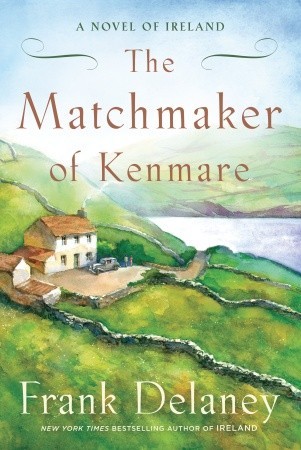 The Second World War may have ended nearly 70 years ago, but it remains a popular setting for novels, including two I've recently read: All Clear by Connie Willis (2010) and The Matchmaker of Kenmare by Frank Delaney (2011). The novels are quite different -- one is a time-travel sci-fi tale set mostly in London during the Blitz and the other is a romance in which an Irish woman ventures into German-occupied territory in search of her missing husband, an American soldier -- but they have two things in common other than time and, occasionally, place.
The Second World War may have ended nearly 70 years ago, but it remains a popular setting for novels, including two I've recently read: All Clear by Connie Willis (2010) and The Matchmaker of Kenmare by Frank Delaney (2011). The novels are quite different -- one is a time-travel sci-fi tale set mostly in London during the Blitz and the other is a romance in which an Irish woman ventures into German-occupied territory in search of her missing husband, an American soldier -- but they have two things in common other than time and, occasionally, place.1. Each continues a story began in a previous novel, Blackout and Venetia Kelly's Traveling Show, respectively.
 2. In neither case does the publisher, Spectra and Random House, respectively, mention on the cover that the book in hand is the second of a two-parter and that it might be helpful to read the first one first. Actually, it's not just helpful, it's practically necessary to understand what's going on. Each novel contains numerous references to events to characters and events from its predecessor. You need to understand these references to make much sense about what you are reading. These are not stand-alone novels like some that are written in a series. You can read a Molly Murphy mystery out of sequence, for example, yet still understand perfectly what's going on in each novel. That's not the case with either All Clear or The Matchmaker of Kenmare.
2. In neither case does the publisher, Spectra and Random House, respectively, mention on the cover that the book in hand is the second of a two-parter and that it might be helpful to read the first one first. Actually, it's not just helpful, it's practically necessary to understand what's going on. Each novel contains numerous references to events to characters and events from its predecessor. You need to understand these references to make much sense about what you are reading. These are not stand-alone novels like some that are written in a series. You can read a Molly Murphy mystery out of sequence, for example, yet still understand perfectly what's going on in each novel. That's not the case with either All Clear or The Matchmaker of Kenmare.I don't read that much science fiction anymore (although I did read an interesting collection of stories called The Future We Wish We Had last month), but when I noticed All Clear in a bookstore, I knew I had to read it. British historians from 2060 travel back in time to study World War II and then get trapped there. How could I not want to read this story? Not until I got home with my prize did I discover there was a another book I needed to read first. So I began the search for Blackout, which was a little more difficult to find.
Fortunately I had already read Venetia Kelly when Matchmaker came out, and I remembered reading in a review that both books feature the same narrator, so I was prepared when I picked up Delaney's latest. Even so I was surprised the publisher doesn't even refer to the earlier novel on the cover of the sequel. Wouldn't that make economic sense from a publishing standpoint? The advantage of series books is that once readers become familiar with the characters in one novel, they will want to read all the other books. Isn't that advantage lost if readers don't even know there is a series?
I may have more to say about each of these novels in the future.
No comments:
Post a Comment